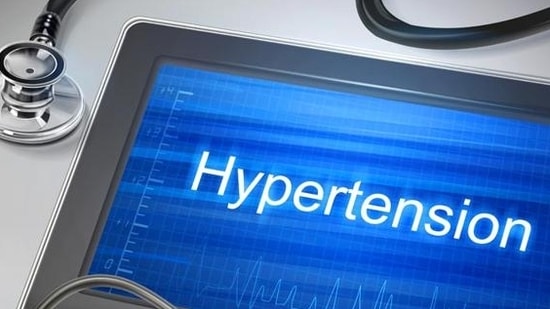Blood
Is your diastolic blood pressure always high? Here’s what it means; when to visit a doctor
This is what it means if your diastolic blood pressure reading is always elevated. Cardiologists list complications and ways to manage.
Do you always get a high diastolic BP reading? Do not take it lightly as ignoring it could lead to health emergencies. Diastolic blood pressure, or the bottom number that you get while measuring blood pressure, is no less important that the systolic blood pressure reading and can tell a lot about your overall health. The number is linked to a higher risk of complication involving the large artery called the aorta that carries blood and oxygen from the heart to distant body parts. If your diastolic blood pressure is constantly coming high, it could pose threat to your brain, kidney, and lead to vision troubles and aneurysm formation. (Also read | Can low blood pressure be deadly? 5 signs and 5 possible complications. Tips to manage)
The diastolic reading is defined as the pressure in the arteries when the heart rests between beats. The ideal range of diastolic blood pressure of an adult is between 60–80 mm Hg. If your reading goes above this number, you must see a doctor.
What is systolic and diastolic blood pressure, and which one is more dangerous?
The blood pressure of a person is depicted by two numbers. The first number is called systolic blood pressure. This is the pressure in blood vessels at the time when heart is contracting and ejecting blood out of heart. The second number is known as diastolic blood pressure. This is the pressure in blood vessels at the time when heart is relaxing.
“Out of the two it is the diastolic blood pressure which is more harmful and has a higher correlation with the development of various diseases. The diastolic blood pressure of an adult should be between 60–80 mm Hg and if the number goes above this it is considered hypertension. The diastolic blood pressure between 80-90 mm Hg, was previously considered pre-hypertension stage and now considered stage 1 hypertension, is usually managed by lifestyle control measures. The diastolic blood pressure above 90 mm Hg may require medications so one should consult a physician. The diastolic blood pressure above 80 mm Hg has been associated with increased risk of complications which increases incrementally,” says Dr Rakesh Rai Sapra, Director and Senior Consultant-Cardiology, Marengo Asia Hospitals, Faridabad.
“While it’s common for the top number (systolic pressure) to fluctuate throughout the day, an elevated diastolic pressure can be a cause for concern. Diastolic hypertension often doesn’t present symptoms until it’s severe, so regular checkups are crucial for early detection. The possible complication that can occur as a result of high diastolic blood pressure is end organ damage (HMOD – hypertension mediated organ damage). When the arteries are constantly under strain due to elevated diastolic blood pressure, it can lead to damage and narrowing of these vital blood vessels. This reduced blood flow puts organs such as the kidneys, brain and heart at risk for short-term and long-term damage. The end organ damage present as heart failure, stroke, cognitive problems, visual disturbances and progressive loss of renal function,” says Dr Ashish Mishra, Consultant Interventional Cardiologist, Wockhardt Hospitals, Mira Road.
When should you visit a doctor?
If you monitor blood pressure at home and consistently notice high diastolic readings, it’s advisable to consult a healthcare professional for a proper evaluation and guidance on how to manage it through lifestyle changes or medication if necessary.
“The healthcare professional shall conduct further tests to determine the underlying cause of your elevated diastolic pressure. Keep in mind that lifestyle factors like stress, lack of physical exercise, excessive alcohol consumption, and smoking can contribute to high blood pressure levels. Making positive changes in these areas may help lower your diastolic pressure. Also remember that regular check-ups with your doctor are crucial for detecting early signs of hypertension or other potential health concerns. Don’t hesitate to seek advice if you’re worried about your blood pressure readings. It’s always better to be safe than sorry when it comes to maintaining good cardiovascular health,” says Dr Mishra.
Complications of high diastolic blood pressure
Dr V. Rajasekhar, Senior Consultant Interventional Cardiologist & Electrophysiologist, Certified Specialist for TAVR (Percutaneous Trans Aortic Valve Replacement), Yashoda Hospitals Hyderabad says when the diastolic reading consistently exceeds 90 mm Hg, it is referred to as diastolic hypertension.
Here are the possible complications due to high diastolic blood pressure
1. Risk of heart disease: Elevated diastolic blood pressure can significantly increase your risk of heart disease. It puts additional strain on your heart and can lead to conditions like coronary artery disease and heart attacks.
2. Stroke risk: High diastolic blood pressure can increase the risk of stroke. When blood pressure is consistently high, it can damage blood vessels in the brain, leading to the formation of blood clots or ruptures in the vessels.
3. Kidney damage: The kidneys play a vital role in regulating blood pressure. Prolonged high diastolic pressure can damage the small blood vessels in the kidneys, potentially leading to chronic kidney disease.
4. Vision problems: Uncontrolled high diastolic blood pressure may harm the blood vessels in your eyes, leading to vision problems, including retinopathy.
5. Aneurysm formation: Prolonged high diastolic blood pressure can weaken the walls of blood vessels, making them susceptible to aneurysms, which are dangerous bulges or weak spots in blood vessel walls.
“If you experience consistently high diastolic blood pressure, it’s crucial to seek medical advice promptly. Your doctor can recommend lifestyle changes, medications, or other treatments to help lower and manage your blood pressure. Lifestyle changes may include dietary modifications, increased physical activity, and stress reduction techniques. Medications, such as diuretics, beta-blockers, or ACE inhibitors, may also be prescribed to help control blood pressure,” says Dr V. Rajasekhar.
- Blood Pressure

